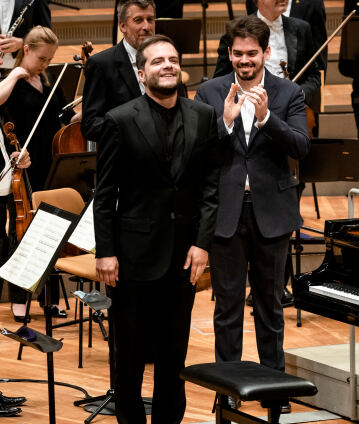Lahav Shani and Francesco Piemontesi

Double debut with two rising stars: Lahav Shani, successor to Zubin Mehta as music director of the Israel Philharmonic Orchestra and principal conductor of the Rotterdam Philharmonic Orchestra, and pianist Francesco Piemontesi, considered one of the most interesting Mozart interpreters of his generation. In this concert, he introduces himself with the last piano concerto by the First Viennese School composer. The main symphonic work is Robert Schumann’s First Symphony, which the newly married composer wrote in the euphoric mood of a new beginning.
While a composer employed by the court in the 18th century had to cater primarily to the tastes of his employer, a freelance artist was faced with a much more complex task. The predominantly middle-class audience of the first public concerts was made up of both die-hard connoisseurs and inexperienced enthusiasts. “To receive applause,” Wolfgang Amadeus Mozart explained to his father, “you have to write things that are so understandable that a coach driver could sing them, or so incomprehensible that, precisely because no sensible person is able to understand them, they like them for that very reason.”
Mozart was able to test this strategy particularly well with Viennese audiences with his piano concertos in his dual role as composer and soloist – a genre that in around two dozen works he shaped like almost no other. The Concerto in B flat major, completed in 1791, was to be his last – something he could not have realised. Characterised by a graceful simplicity that only a Mozart could risk, it concludes with a playful rondo on the song Sehnsucht nach dem Frühling.
Fifty years later, Robert Schumann outlined his First Symphony. As Beethoven’s legacy weighed heavily on him, he had until then been plagued by severe “symphonic scruples”. He suddenly overcame them in 1839 in a Viennese attic, where Schumann discovered Schubert’s “Great” C major Symphony among his personal papers – and in it, a “whole new world”. When he heard the piece in a rehearsal, he confessed to his fiancée Clara Wieck: “I wish nothing more than that you were my wife and I could write symphonies like this.” Both of these were easier said than done, as Clara’s father Friedrich Wieck tried his best to prevent the couple’s marriage. A penniless composer as a bridegroom who had nothing to offer his daughter, who was already famous as a pianist, was out of the question. Schumann took Wieck to court – and won. The hard-fought wedding in the autumn of 1840 finally provided the final motivational boost that gave rise to the “Spring Symphony”, as Schumann christened his first of the genre.
© 2020 Berlin Phil Media GmbH
Related interviews